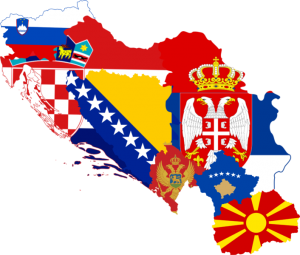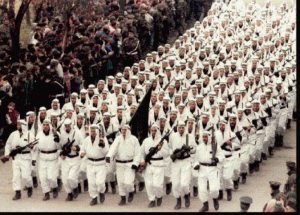
Views: 1034
General James Mattis, the US Secretary of Defence, visited Macedonia on September 17 and declared that “We do not want to see Russia doing [in Macedonia] what they have tried to do in so many other countries. No doubt that they have transferred money and they are also conducting broader influence campaigns.”
His observations were made in the run-up to the referendum to be held on September 30 in which Macedonians will vote on a deal reached in June with Greece that would change the country’s name to the Republic of Northern Macedonia. The referendum question is “Do you support EU and NATO membership by accepting the agreement between Macedonia and Greece?” and the outcome will be interesting, but Mattis failed to see the supreme irony in the fact that his visit to Macedonia was specifically to conduct a “broader influence campaign” by standing next to its prime minister Zoran Zaev as he announced that “There is no alternative for the Republic of Macedonia than integration into NATO and EU.”
Influence, anyone?
Although Macedonia (population two million) is not a member of NATO it has 244 soldiers in Afghanistan as part of the futile US-NATO-“coalition” mission and Washington wants the military bonds to be closer. It isn’t exactly a great military power, with an army of about 8,000, and it isn’t close to the border with Russia, along which there is an increasingly confrontational US-NATO military presence, but the Pentagon and its sub-office in Brussels always welcome more members to their alliance. And who better than General Mattis to exercise “broader influence” on Macedonia to encourage it to join the team confronting Russia.
While in Macedonia Mattis declared the vote to be the “most important” in Macedonia’s history, and assured everyone that a pro-NATO result would result in “economic prosperity and increased foreign investment.” It would “unlock the Nato accession process and allow you . . . to determine your own future in institutions made up of like-minded countries.”
Predictably, Mattis was in line with NATO Secretary General Jens Stoltenberg, who also visited Macedonia in September and announced that “We are ready to welcome your country as NATO’s 30th member,” telling its people that the referendum “is a once in a lifetime opportunity to join the international community . . .” Was he trying to influence anyone?
General Mattis is rabidly anti-Russian and hostile to a great many other countries, people and organisations. It is now almost forgotten that he is the man who replied to a question in 2005 about the US war in Afghanistan by uttering the psychotic pronouncement that “Actually it’s quite fun to fight them, you know. It’s a hell of a hoot. It’s fun to shoot some people. I’ll be right up there with you. I like brawling.” He is obviously a person who can bring balance and sympathetic understanding to international affairs.
As recorded in the New Yorker, “on January 22nd, two days after President Trump was inaugurated, he received a memo from his new Secretary of Defence, James Mattis, recommending that the United States launch a military strike in Yemen.”
Yemen was then and still is in a state of civil war. The country has nothing to do with the United States, but in 2017 the intelligence community in the US said they had discovered that a group of alleged anti-American terrorists were in a small village called al-Ghayil and it was decided by the Best and the Brightest in Washington to attack the place.
The operation Mattis wanted the president to authorise was intended to kill people, of course, and specifically a supposed leader of Al Qaeda; so Mattis and the National Security Adviser, General Michael Flynn, and the Chairman of the Joint Chiefs of Staff, General Joe Dunford had dinner with President Trump, who then decided to go ahead with what turned out to be a totally disastrous military operation.
It was a tragic farce. As reported in the Washington Post, instead of a clean quick special forces’ attack on the village, “a massive firefight ensued, claiming the life of an American sailor and at least one Yemeni child, and serving as an early lesson for President Trump’s national security team about the perils of overseas ground operations.”
“An elite Special Operations air regiment was then sent in to pull the team and its casualties out of the fray, banking into the night under heavy fire to link up with a Marine quick-reaction force that had taken off in MV-22 Ospreys from the US ship Makin Island floating offshore.” In the course of the operation, Chief Petty Officer Ryan Owens, a navy commando, was killed, and one of the $75 million Ospreys was destroyed.
In other words, the whole thing was an utter shambles.
But the spin doctors in Washington couldn’t admit that their operation had failed, and Trump announced that Mattis had told him it had been a “highly successful raid that generated large amounts of vital intelligence that will lead to many more victories in the future against our enemies.” The brawl had been a ball.
Thank you, General Mattis, the man who declared “It’s fun to shoot some people” and alleges that Russia carries out “broader influence campaigns” and then does his best to influence Macedonia by declaring to its citizens that “You would join an alliance in which countries large and small work together to uphold shared principles of national sovereignty, territorial integrity, and freedom from coercion, while others seek to diminish these very values, sowing discord from Syria to the Ukraine.” This is from the defence secretary of a nation that has sowed catastrophic discord in Afghanistan, then in Iraq and through the whole Middle East, to Libya which the Pentagon and NATO bombed and blitzed to a state of utter chaos in what General Mattis might call a “broader influence campaign.”
 Macedonia will probably become a member of the US-NATO anti-Russia military alliance, along with Ukraine, and the confrontation with Russia will continue to escalate in the new US-NATO Cold War. And who knows what else might be planned by those attending a future military dinner with Trump. After all, “It’s fun to shoot some people.”
Macedonia will probably become a member of the US-NATO anti-Russia military alliance, along with Ukraine, and the confrontation with Russia will continue to escalate in the new US-NATO Cold War. And who knows what else might be planned by those attending a future military dinner with Trump. After all, “It’s fun to shoot some people.”
Originally published on 2018-09-14
About the author: Brian Cloughley is British and Australian armies’ veteran, former deputy head of the UN military mission in Kashmir and Australian defense attaché in Pakistan
Source: Strategic Culture Foundation
Origins of images: Facebook, Twitter, Wikimedia, Wikipedia, Flickr, Google, Imageinjection & Pinterest.
Read our Disclaimer/Legal Statement!
Donate to Support Us
We would like to ask you to consider a small donation to help our team keep working. We accept no advertising and rely only on you, our readers, to keep us digging the truth on history, global politics and international relations.
FOLLOW US ON OUR SOCIAL PLATFORMS











